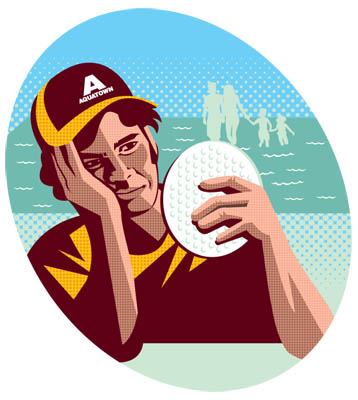Many service technicians are no longer comfortable performing work meant to bring about compliance with the VGB Act.
Some avoid it as much as possible. “It’s a nightmare. Why would anyone want to do it?” said Kevin Wallace, president of San Diego-based Underwater Unlimited Inc., who only performs the work under strict conditions.
Last May, the U.S. Consumer Product Safety Commission recalled up to 1 million drain covers that had been stamped as VGB-compliant. Further action came in September, when the agency tightened the criteria for unblockable drains, stipulating that those not meeting the new definition must be retrofitted by May 28, 2012.
Techs cite a number of reasons for not wanting to do the work, including the long delays getting reimbursed by manufacturers of the drain covers.
“There is some concern,” said Jim Von Allmen, owner of AAA Pool Maintenance in Camarillo, Calif. “I’ve done a bunch of them already. Some of them I got paid for, some of them I didn’t.”
And when the check does come, often the amount isn’t sufficient to cover the work that was performed, professionals say. There also have been arguments about whether some work is reimbursable if, for instance, the recall guidelines were changed midstream or misunderstood.
But in many cases, the concerns go beyond the immediate bottom line. Some techs fear that CPSC will institute more changes, thus invalidating any work done this year. Others are worried about liability, stating that they originally performed VGB work to comply with the language at the time, but now the stipulations have changed. If CPSC does another about-face and there’s an accident, to what standard will the court hold companies?
“The rules keep changing,” said Steve Dunn, vice president of Commercial Pool Systems Inc., a distributor in Martinez, Calif. “A lot of [techs] have made the decision not to do any more VGB work because the liability has become even greater than it was originally.”
Other service professionals are suffering VGB fatigue brought on by inconsistencies between CPSC requirements and those from local health departments.
Ironically, some of those who were most vehement about compliance before the 2008 deadline now have become the most burned-out. “I’ve completely stopped doing it,” said Jib Bowe, a technician who at first embraced the law and sought every educational opportunity available to learn about compliance.
“Since [the law] changes on a daily basis, companies are not paying to do retrofits on the voluntary recall covers,” said Bowe, manager of Bay Pool Systems in Monterey, Calif. “The best we can do is educate people and let them try to find somebody on their own.”
Though some techs refuse to do any recall work at all, the majority are still accepting VGB jobs within certain restrictions.
“If they’re our clients, and we did the past VGB work, we’ll do [recall work] if we’re pressured,” said Richard Dietz Sr., president of Aqua Creations in Ventura, Calif. “But we’re not offering.”
Because of this, he and others only perform recall work if the facility owner agrees to a complete inspection of the pool and is willing to pay for any other work needed to bring the pool into true compliance.
“Too many of these pools were not [retrofitted] properly in the first place,” Wallace said. “You can’t just put on a new, approved cover if it’s not in compliance to begin with. If you put on a retrofit cover and walk away, then you own it — you’re liable.”




